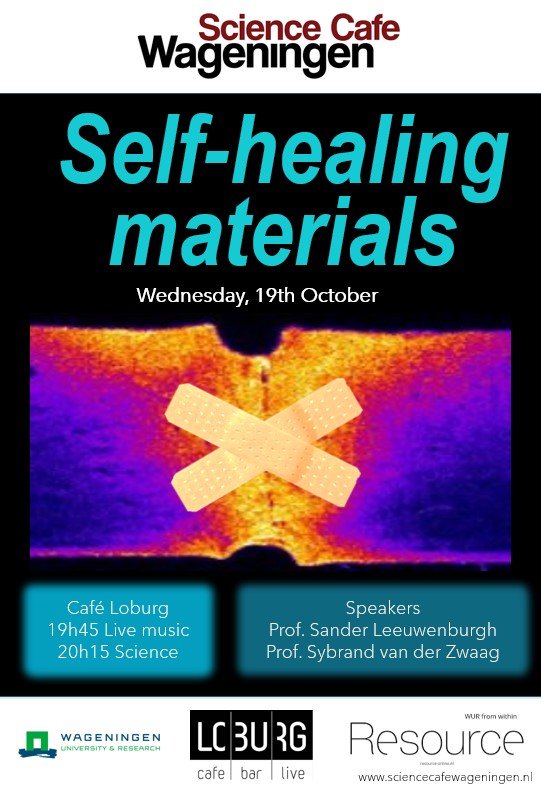Wednesday October 19th
19:45 live music
20:15 speakers
Café Loburg
Just imagine that materials as we know them for centuries would become able to heal fully by themselves after cracking. If this were a reality that would immediately make us think differently about the world that we live in. Although this may sound like science fiction, many developments are taking place that can make this a reality very soon, and some applications already exist. In this science café, two experts from Radboud University in Nijmegen (Prof. Sander Leeuwenburgh) and Delft University of Technology (Prof. Sybrand van der Zwaag) will introduce us to the magical world of self-healing materials.
Prof. van der Zwaag will present the general concept of self-healing materials and explain how it differs from the conventional optimalisation routes for man-made materials. The translation of the concept into a new material is material class dependent, so solutions for polymers, ceramics, concrete, metals and composites will be different. He will also share with us some solutions ready to enter the market. Prof. Leeuwenburgh will focus on the medical field. He will share his insights in the evolution of self-healing biomaterials from self-healing of capsule-filled dental fillers and bone cements to the self-healing behavior of modern injectable hydrogels used in regenerative medicine. He will explain why self-healing properties of biomaterials are crucial for minimally invasive injection into the human body and achieve successful tissue regeneration.
Prof. Sander Leeuwenburgh studied Materials Science and Engineering at Delft University of Technology as well as classical piano at the Conservatory of Arnhem. He obtained his PhD degree in the field of bioceramic coatings for dental and orthopedic implantology at Radboud University Medical Center in 2006. In 2018 he was appointed as full professor Regenerative Biomaterials at Radboud University Medical Center. The main ambition of his group is to decipher how biomaterials can trigger regeneration of bone tissue, aiming at translation of basic research findings towards novel therapies in regenerative medicine.
Prof. Sybrand van der Zwaag studied metallurgy at the TUDelft and got a PhD in applied physics from Cambridge University. He then joined Akzo Nobel to work on its new high performance polymeric fiber, now called Twaron. In 1992 he became full professor at the TUD in the field of Microstructural Control in Metals. In 2003 he established the chair Novel Aerospace Materials at the same university and spent a considerable amount of his time on developing the field of self-healing materials as the scientific director of various local, national and international research programs. He retired in September 2021.

